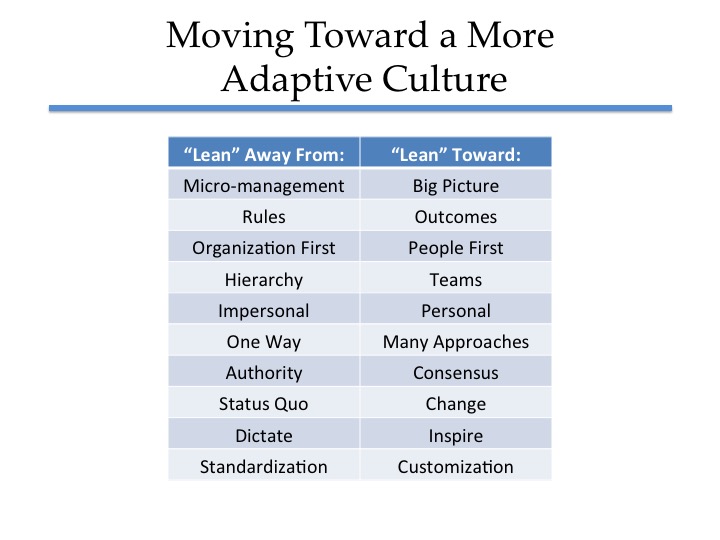UAB Management Professor and Associate Dean for Graduate Education Peter Ginter, PhD, presented the latest CCTS Training Interdisciplinary & Emerging Research Scholars (TIERS) event, sharing 25 of his best tips for what leaders can and cannot do to develop an adaptive culture in the workplace.
Chief among these was “Leaders establish organizational direction and shape organizational culture…their job is to remove the barriers for their employees who are on the front lines.” He emphasized it’s the behaviors, attitudes, and values that leaders bring to the workplace that are important.
 Management expert Dr. Peter Ginter’s “leans” list for leaders.
Management expert Dr. Peter Ginter’s “leans” list for leaders.
Ginter urged the audience to remember this takeaway message if nothing else from his talk. There were, however, plenty of other “unproven, somewhat counter-intuitive, sometimes irreverent, often overlapping, occasionally difficult to do, probably overly idealistic principles” worth noting.
Before launching into his list, he briefly explained the benefits of an adaptive culture. “It enables the organization to meet ongoing challenges and anticipate and respond to change; fosters a sense of individual ownership in employees and expects independent judgment from everyone; and empowers people throughout the organization, instilling a drive to seek opportunities for improvement.”
Noting most of the aspiring leaders in the audience might find it hard to implement all 25 tips, he suggested there were several “critical” ones to try to do and “if they go well, everything is great.”:
- Make the organization a fun, interesting place to work—“If folks are saying ‘Thank God it’s Friday’ every week, you know there’s a problem.”
- Grow everyone in your organization. Some may leave, but many will stay.
- Make everyone feel safe to speak.
- Pay as much as you can.
- Reduce hierarchy and keep units small.
- Get out of your office and “talk to people, visit them in their space. Notice them for great work and thank them.”
Ginter warned that for some researchers with a passion for investigation, leadership might require more than they are willing to give, personally and professionally. “You can’t always keep up the same research intensity, you now have an obligation to your team, which can cost you in family time and publications.”
To those whose career goals include stepping into leadership roles, his final tip was to “embrace change and find happiness in what you do. A great job wins over great pay.”
Dr. Peter Ginter actively researches strategic management, leadership, and healthcare organizations. He has authored or coauthored 16 books including Strategic Management of Health Care Organizations, 7th edition (2013) and Public Health Leadership and Management (2002).